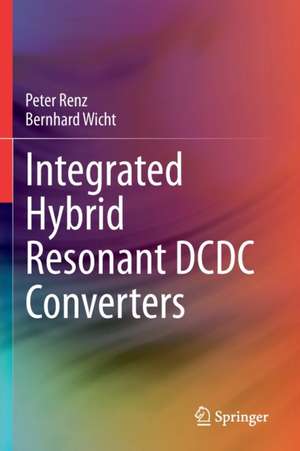Integrated Hybrid Resonant DCDC Converters
Autor Peter Renz, Bernhard Wichten Limba Engleză Paperback – 31 dec 2021
- Introduces a new, multi-ratio resonant converter architecture, which enables lower switching frequencies and better passive component utilization;
- Discusses circuit block design for high efficiency of the power stage;
- Explores implementation details and concepts for integrated passives;
- Derives models, implements and compares to each other different control mechanisms.
| Toate formatele și edițiile | Preț | Express |
|---|---|---|
| Paperback (1) | 578.70 lei 6-8 săpt. | |
| Springer International Publishing – 31 dec 2021 | 578.70 lei 6-8 săpt. | |
| Hardback (1) | 584.76 lei 6-8 săpt. | |
| Springer International Publishing – 30 dec 2020 | 584.76 lei 6-8 săpt. |
Preț: 578.70 lei
Preț vechi: 680.82 lei
-15% Nou
Puncte Express: 868
Preț estimativ în valută:
110.73€ • 115.62$ • 91.44£
110.73€ • 115.62$ • 91.44£
Carte tipărită la comandă
Livrare economică 15-29 aprilie
Preluare comenzi: 021 569.72.76
Specificații
ISBN-13: 9783030639464
ISBN-10: 3030639460
Pagini: 171
Ilustrații: XV, 171 p. 124 illus., 86 illus. in color.
Dimensiuni: 155 x 235 mm
Greutate: 0.27 kg
Ediția:1st ed. 2021
Editura: Springer International Publishing
Colecția Springer
Locul publicării:Cham, Switzerland
ISBN-10: 3030639460
Pagini: 171
Ilustrații: XV, 171 p. 124 illus., 86 illus. in color.
Dimensiuni: 155 x 235 mm
Greutate: 0.27 kg
Ediția:1st ed. 2021
Editura: Springer International Publishing
Colecția Springer
Locul publicării:Cham, Switzerland
Cuprins
Introduction.- Motivation and Fundamentals.- Multi-Ratio Resonant Switched-Capacitor Converters.- Circuit Implementation for High Efficiency.- Integrated Passives.- Control of Resonant Switched-Capacitor Converters.
Notă biografică
Peter Renz received the B.Eng. degree in mechatronics/electrical engineering from the Reutlingen University, Germany, in 2013 and the M.Sc. degree in power and microelectronics from Robert Bosch Center for Power Electronics at Reutlingen University, Germany, in 2015. He received the Ph.D. degree (Summa Cum Laude) from Leibniz University Hannover in 2020, where he was working on fully integrated resonant DCDC converters in cooperation with the Kilby Labs department of Texas Instruments in Freising, Germany. In 2020, he joined the ASIC design unit at Robert Bosch GmbH in Reutlingen, Germany. His current research interests include fully integrated power management and high-frequency DCDC conversion. Dr. Renz received the 2019 First Prize Paper Award of the IEEE Journal of Emerging and Selected Topics in Power Electronics.
Bernhard Wicht has 20+ years of experience in analog and power management IC design. He received the Dipl. Ing. degree in electrical engineering from University of Technology Dresden, Germany, in 1996 and the Ph.D. degree (Summa Cum Laude) from University of Technology Munich, Germany, in 2002. Between 2003 and 2010, he was with Texas Instruments, Freising, responsible for the design of automotive power management ICs. In September 2010, he became a full professor for integrated circuit design and a member of the Robert Bosch Center for Power Electronics at Reutlingen University, Germany. Since April 2017, he has been heading the Chair for Mixed-Signal IC Design at Leibniz University Hannover, Germany. His research interest includes IC design with focus on power management, gate drivers and high-voltage ICs. Dr. Wicht was co-recipient of the 2015 ESSCIRC Best Paper Award and of the 2019 First Prize Paper Award of the IEEE Journal of Emerging and Selected Topics in Power Electronics. In 2018, he received the faculty award for excellent teaching at his university. He invented seventeen patents with several more pending. He is currently amember of the Technical Program Committee of ISSCC and he is also a Distinguished Lecturer of the IEEE Solid-State Circuits Society
Bernhard Wicht has 20+ years of experience in analog and power management IC design. He received the Dipl. Ing. degree in electrical engineering from University of Technology Dresden, Germany, in 1996 and the Ph.D. degree (Summa Cum Laude) from University of Technology Munich, Germany, in 2002. Between 2003 and 2010, he was with Texas Instruments, Freising, responsible for the design of automotive power management ICs. In September 2010, he became a full professor for integrated circuit design and a member of the Robert Bosch Center for Power Electronics at Reutlingen University, Germany. Since April 2017, he has been heading the Chair for Mixed-Signal IC Design at Leibniz University Hannover, Germany. His research interest includes IC design with focus on power management, gate drivers and high-voltage ICs. Dr. Wicht was co-recipient of the 2015 ESSCIRC Best Paper Award and of the 2019 First Prize Paper Award of the IEEE Journal of Emerging and Selected Topics in Power Electronics. In 2018, he received the faculty award for excellent teaching at his university. He invented seventeen patents with several more pending. He is currently amember of the Technical Program Committee of ISSCC and he is also a Distinguished Lecturer of the IEEE Solid-State Circuits Society
Textul de pe ultima copertă
This book provides a comprehensive, single-source on resonant switched-capacitor converters. It is written in the style of a handbook, with systematic guidelines, and includes implementation examples. The authors explore integrated hybrid resonant DCDC converters in order to achieve highly compact, energy efficient and cost-effective power management solutions in the growing fields of wearables and internet-of-things applications. They provide an introduction into hybrid converters as a new and promising converter class, which merges capacitive and inductive conversion concepts into one. Coverage ranges from fundamentals to implementation details, including topics such as power stage design, gate drive schemes, different control mechanisms for resonant operation and integrated passives.
- Introduces a new, multi-ratio resonant converter architecture, which enables lower switching frequencies and better passive component utilization;
- Discusses circuit block designfor high efficiency of the power stage;
- Explores implementation details and concepts for integrated passives;
- Derives models, implements and compares to each other different control mechanisms.
Caracteristici
Introduces a new, multi-ratio resonant converter architecture, which enables lower switching frequencies and better passive component utilization Discusses circuit block design for high ef?ciency of the power stage Explores implementation details and concepts for integrated passives Derives models, implements and compares to each other different control mechanisms
